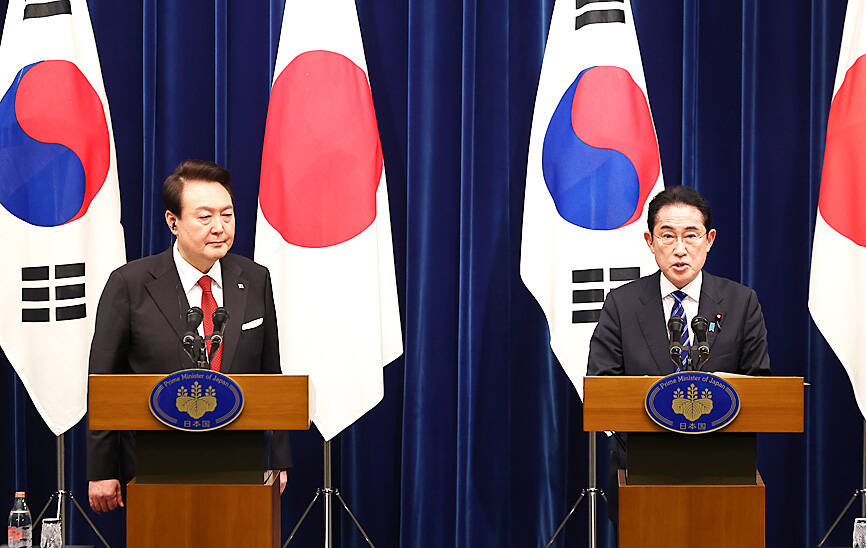Japan and South Korea agreed to resume regular visits between their leaders and take steps to resolve a trade dispute at a highly anticipated summit yesterday, in what Japanese Prime Minister Fumio Kishida called a “big step” toward rebuilding the two nations’ security and economic ties as they try to overcome a century of difficult history.
The summit could revise the strategic map of northeast Asia. The two US allies, who have long been at odds over their history, are seeking to form a united front, driven by shared concerns about a restive North Korea and a more powerful China.
Kishida and South Korean President Yoon Suk-yeol stressed the importance of improved ties as they opened the summit, hours after a North Korean missile launch, and encounters between Japanese and Chinese vessels in disputed waters.

Photo: EPA-EFE
In his opening remarks, Kishida said that the meeting would mark the resumption of regular visits between the leaders, which have been on hold for more than a decade.
He told a joint news conference that the countries had agreed to resume defense dialogue and vice ministerial strategic talks, while also restarting a process of trilateral communication among Japan, South Korea and China.
Yoon said the meeting “has special significance as it shows the people of both countries that South Korea-Japan relations are off to a new beginning after being plagued by various issues.”
He added that the two countries share the same democratic values and “are partners that must cooperate on security, economic issues and global agendas.”
“The ever-escalating threat of North Korea’s nuclear missile program poses a huge threat to peace and stability not only in East Asia, but also to the [broader] international community,” Yoon said.
“South Korea and Japan need to work closely together and in solidarity to wisely counter the threat,” he added.
Washington appears to have worked intensively to bring about the summit.
US Ambassador to Japan Rahm Emanuel said his country and its two allies had about 40 trilateral meetings and he thinks cooperation in the process helped to build up trust.
Hours before the summit began, South Korean Minister of Trade, Industry and Energy Lee Chang-yang said that Japan had agreed to lift export controls on South Korea following talks this week, and that South Korea would withdraw its complaint to the WTO once the curbs are removed.
Japan and South Korea have long had disputes over the 1910-1945 Japanese colonization of the Korean Peninsula and atrocities during World War II, which included forced prostitution of “comfort women” for Japanese soldiers, and territorial disputes over a cluster of islands.
Ties reached a nadir when the South Korean Supreme Court ordered Japanese companies to pay compensation to Korean victims or bereaved relatives in 2018, and Japan imposed trade sanctions on South Korea shortly after.
The Japanese Ministry of Economy, Trade and Industry said Tokyo acknowledged improvement in South Korean export controls during the talks and said that as a result of Seoul’s decision to drop the WTO case, Japan decided to drop restrictions against South Korea and restore the country to the status it had before July 2019.

DEFENDING DEMOCRACY: Taiwan shares the same values as those that fought in WWII, and nations must unite to halt the expansion of a new authoritarian bloc, Lai said The government yesterday held a commemoration ceremony for Victory in Europe (V-E) Day, joining the rest of the world for the first time to mark the anniversary of the end of World War II in Europe. Taiwan honoring V-E Day signifies “our growing connections with the international community,” President William Lai (賴清德) said at a reception in Taipei on the 80th anniversary of V-E Day. One of the major lessons of World War II is that “authoritarianism and aggression lead only to slaughter, tragedy and greater inequality,” Lai said. Even more importantly, the war also taught people that “those who cherish peace cannot

STEADFAST FRIEND: The bills encourage increased Taiwan-US engagement and address China’s distortion of UN Resolution 2758 to isolate Taiwan internationally The Presidential Office yesterday thanked the US House of Representatives for unanimously passing two Taiwan-related bills highlighting its solid support for Taiwan’s democracy and global participation, and for deepening bilateral relations. One of the bills, the Taiwan Assurance Implementation Act, requires the US Department of State to periodically review its guidelines for engagement with Taiwan, and report to the US Congress on the guidelines and plans to lift self-imposed limitations on US-Taiwan engagement. The other bill is the Taiwan International Solidarity Act, which clarifies that UN Resolution 2758 does not address the issue of the representation of Taiwan or its people in

Taiwanese Olympic badminton men’s doubles gold medalist Wang Chi-lin (王齊麟) and his new partner, Chiu Hsiang-chieh (邱相榤), clinched the men’s doubles title at the Yonex Taipei Open yesterday, becoming the second Taiwanese team to win a title in the tournament. Ranked 19th in the world, the Taiwanese duo defeated Kang Min-hyuk and Ki Dong-ju of South Korea 21-18, 21-15 in a pulsating 43-minute final to clinch their first doubles title after teaming up last year. Wang, the men’s doubles gold medalist at the 2020 and 2024 Olympics, partnered with Chiu in August last year after the retirement of his teammate Lee Yang

The Philippines yesterday criticized a “high-risk” maneuver by a Chinese vessel near the disputed Scarborough Shoal (Huangyan Island, 黃岩島) in a rare incident involving warships from the two navies. The Scarborough Shoal — a triangular chain of reefs and rocks in the contested South China Sea — has been a flash point between the countries since China seized it from the Philippines in 2012. Taiwan also claims the shoal. Monday’s encounter took place approximately 11.8 nautical miles (22km) southeast” of the Scarborough Shoal, the Philippine military said, during ongoing US-Philippine military exercises that Beijing has criticized as destabilizing. “The Chinese frigate BN 554 was